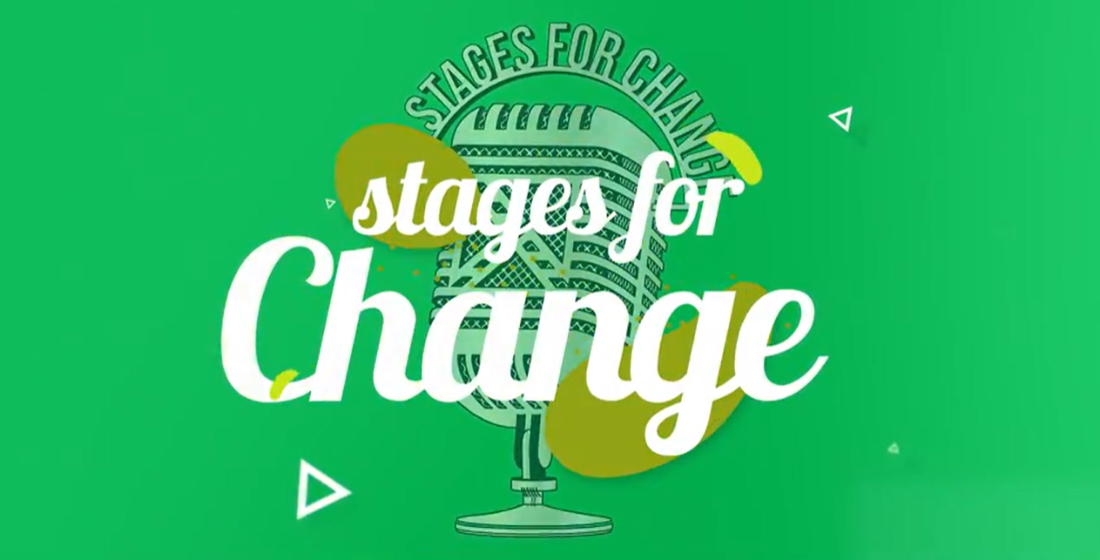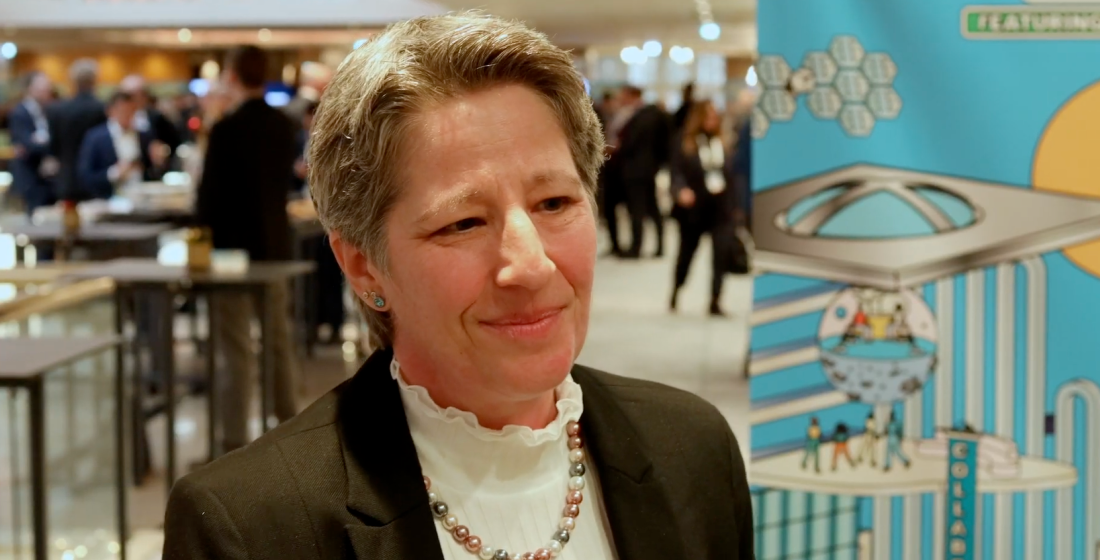Stages for Change: ‘We have an opportunity to do something good’
In this week’s edition of the Stages for Change interview series, Eavie Burnett speaks with SWIFT’s Louise Taylor-Digby on the impact that a career in trade can have, and the importance of viewing the industry as an ecosystem

Trade is the lifeblood of the economy. It connects with everything we see around us. This multifaceted industry is not just about moving goods from A to B – it’s about how local businesses across the world survive and prosper.
Somebody who knows exactly how and why trade matters is SWIFT’s Head of Trade Strategy, Louise Taylor-Digby. Based in Singapore, Louise has worked in various roles across the banking and trade space for over 15 years – incidentally, she’s also the only person with a Northern English accent that I have yet to come across in the industry. This is a truly international business, after all.
And with this internationalism comes a vast array of opportunities for the trade professional, not just for personal development, but to leave a lasting impact on society. These are just some of the reasons Louise cites as her motivation to work in trade herself, and to encourage others to do the same. We caught up with her on the journey she’s made in trade so far, including the excitement and challenges brought by the current digitization of trade.

Eavie Burnett: Can you tell us a bit about your career so far and how you came to your current role at SWIFT?
Louise Taylor-Digby: I started working in Banking in the maritime city of Liverpool, in my late teens. I was studying business at university in the day, and working in a bank in the evening. My evening job led to a place on the bank’s graduate leadership program, which took me from Liverpool to its head office in London. I was given the opportunity to rotate across different parts of the organization, which allowed me to experience different business functions before making that important decision on what to focus on eventually.
Transaction banking really appealed to me. At university, my dissertation explored the natural resource curse hypothesis. I was genuinely fascinated by the interconnectedness of trade, money flows and socioeconomics. Transaction Banking brought all of these together - banks, corporates, and even governments.
I took on my first risk and revenue responsibilities just before the global financial crisis. This was interesting timing, and it proved to be a huge baptism of fire for me. Thankfully, I had an incredible boss at that time, and I still hold on to his advice today. He said to me, ‘this is going to be tough, but you need to hang on in there, because you're going to gain ten years of knowledge and experience in one or two’.
In the years that followed, I was grateful to be given international responsibilities in transaction banking across North America and Asia Pacific. This offered me diverse lessons and experiences that have helped shape me today.
Being in Asia really opened my eyes to FinTech. At the same time, I was concerned about becoming a one trick pony, having worked in banking since my late teens. I started to wonder if I was missing something here. This prompted me to explore new opportunities in adjacent sectors.
But why SWIFT? As a financial technology company, SWIFT is known for innovating and collaborating with the global community at a scale second to none. At that time, I was enthused to see SWIFT experimenting with new entrants such as R3, and looking at ways to introduce payments initiation into new trade platforms. The organization was also rethinking its trade strategy, and was prepared to take a step back when it came to initiatives that did not scale.
SWIFT facilitates large volumes of trade, making it an important player in the trade space. Last year for example, it facilitated two trillion dollars of trade in over 200 countries. So joining SWIFT presented itself as a unique opportunity, especially in Singapore, another maritime city. I started on the Mersey, and now I’m on the Straits of Malacca!
Eavie: It's interesting that you use the word ‘interconnected’ there. You’ve also mentioned international experience and the breadth and depth of the industry, bringing to mind this word ‘ecosystem’, which we hear so much of in relation to trade. What does the concept of trade as an ecosystem mean to you, and why is it important?
Louise: I'm really pleased you brought this up, because the word ‘ecosystem’ gets thrown around a lot, but what does it actually mean?
First of all, trade makes for a fascinating day job! The answer to the exam questions in trade are never straightforward. There are so many different components, and this creates opportunities to work with so many diverse individuals. Trade is not just about the banks. It is certainly not just about technology. Trade is ubiquitous - the lifeblood of economies, and it drives GDP and employment growth, making it a core focus for governments and policy makers.
Pragmatically, trade is a vast and diverse interconnected business community – with the buyers and suppliers at its heart. From MNCs to MSMEs - their trade activities as producers, manufacturers, and retailers drive commerce into other sub-ecosystems - each with their own unique set of actors, rules and practices. These sub-ecosystems span a number of industries, including the transportation sectors, banking and financing, insurance and customs, but also the law, and of course technology. All of these areas need to work together to fundamentally help trade, and in turn, economies to continue functioning.
Looking at each sub-section in silos can be dangerous. Navigating an eco-system requires a macro-micro switch. The devil is often in the detail but we cannot afford to lose sight of the implications for the wider ecosystem. Becoming an expert in all areas of global trade is a tall order – trade is just too vast – so we should continue to build diverse teams, encourage each other to ask questions and better understand the different perspectives and incentives across the entire ecosystem. That’s partly where the answer to progress in trade digitisation really lies - by coming together and sharing knowledge.
Eavie: I want to turn our focus to trade digitization. It’s on top of everyone’s minds at the moment, but it’s not just our industry that stands to benefit. What broader impacts will trade digitization have?
Let's put technology aside for a moment because technology is just an enabler. Most importers and exporters are technology-agnostic. Doing business efficiently is a priority for them and fundamentally, the more friction we remove from trade, the more we enable people - and not just corporations - to prosper and economies to grow. It really is that simple.
If we are able to speed up SME access to trade finance from weeks to hours, think about the potential that we are opening up for businesses. As we remove that friction - paper, for example - and we move to digitised, richer, more standardized data, we don't just stand to benefit from operational gains. We also achieve a level of transparency, and with that transparency, we are able to help banks and financiers make better-informed risk assessments, capital models and in the process, improve access to finance for businesses. Crucially, this data and transparency can also help us tackle all sorts of financial crime and environmental and sustainability goals.
Supply chains are inherently opaque. This has been well documented and it is challenging to align on things like ESG goals and standards. Understanding the provenance and the impact of goods enables us to drive different behaviours and outcomes for society as a whole.
Let’s take a look at Halotrade. Their work on sustainable supply chains have benefitted 10,000 Malawian tea farmers. We’re talking about tangible societal benefits here. The farmers receive better data about their own land, quicker access to cash at better margins.
The benefits of trade are far reaching, and the past year alone has served to remind us that digitization in trade finance can lead to richer data and in turn, better risk management and capital modelling.
Eavie: In your mind, what is the end goal with trade digitization? Where are we heading, and what challenges do we need to head off in order to get there?
The end goal in my mind is frictionless trade and richer data. This could offer significant societal benefits.
To get there, there are a few considerations. I spoke earlier about the complexities of the trade ecosystem. To overcome these challenges, community collaboration is essential. We need common standards, interoperability, and legislative reforms.
I never fully appreciated the importance of standards until I joined SWIFT, even though I've been in banking for over 15 years. With standards, it is not just about documenting something, it is making sure that it becomes embedded in business processes and that it consistently works across a global and diverse community.
It's incredible how much work and expertise goes into ensuring that the world can communicate and identify each other securely, efficiently and seamlessly – identity data and security standards play a pivotal role in this area. SWIFT is not alone on this quest. Other initiatives such as the Digital Container Shipping Authority and the International Chamber of Commerce’s Digital Standards Initiative, also contribute to this goal. The important thing to remember is that it is not about one body setting a standard and everyone else following. These are highly collaborative, incredibly detailed efforts that often take place behind the scenes. We talk about ISO20022 a lot at SWIFT, but we don't own it. ISO20022 can be used by anyone on any platform, and our journey to standards setting is very much a collaborative one.
I'm also really excited about our new partnership strategy and our plans to bring our standardisation expertise to community APIs. I think we can really help digitization initiatives to scale by making them available in globally standardised API specifications that can be consumed by the global community using existing and scaled identity and security protocols. In fact, we've already started to do that with trusted third parties across the ecosystem.
We need to recognise, as the ICC has with its Digital Standards Initiative (DSI), that you can’t just standardize one part of the ecosystem. Oswald Kuyler’s work with the ICC for example, engages the shipping sector, multiple industries across the corporate landscape and the banking space - because we need consistent standards across all of these sub-components of the community in order for digitization to scale.
I mentioned legislative reform, and I want to stress that legal recognition of electronic trade documents is key. It's encouraging to see that the legal harmonisation offered by the United Nations’ UNCITRAL Model Law for Electronic Transferable Records (MLETR) has led to successful law changes with adoption in Bahrain, Singapore and Abu Dhabi Global Market (ADGM). Encouragingly, we have also seen reference to legal changes made in the Regional Comprehensive Economic Partnership (RCEP), which is the world's largest trade agreement. The G7 also made a commitment to promote adoption of legal frameworks compatible with the principles of UNCITRAL’s MLETR, and give legal recognition to electronic transferable records. The law commission of England and Wales has also published a detailed consultation on changes to English law.
The next big exam question is how might we operationalise and implement the law changes? Practically, how might we turn these new enabling laws into systems, products and processes that work across banks and corporates and carriers? The risk of forming digital islands, comprised solely of individual registries of electronic transferable records and their individual nuances, is that they may only serve a single set of challenges, and this may not be scalable in an industry that is by design, cross-border.
Together, I genuinely believe that we have an opportunity to build an interoperable ecosystem that will inevitably be characterized by different platforms and value-added services, agnostic to technology. But I see us being brought together by super connectors that offer standardization, neutrality and governance. It is unlikely that there will be one dominant platform, because trade cuts across so many different sections of financial and physical supply chains.
Eavie: You’ve painted quite the picture of trade’s interoperable ecosystem. With all of this in mind, why is trade the industry for you?
Louise: Trade is not just one industry, it is multiple industries. And I hope that serves as a call to action to talented individuals out there to explore the sector. The breadth and the diversity that trade offers is genuinely motivating and inspiring. At the end of the day, trade can really be a force for good. Let's go back to those 10,000 Malawian tea makers. We really have an opportunity to be a force for good here.
Connect to Louise on LinkedIn here
Got a colleague who you’d like to recommend for our Stages for Change
interview series? Get in touch by emailing eavie.burnett@txfmedia.com





